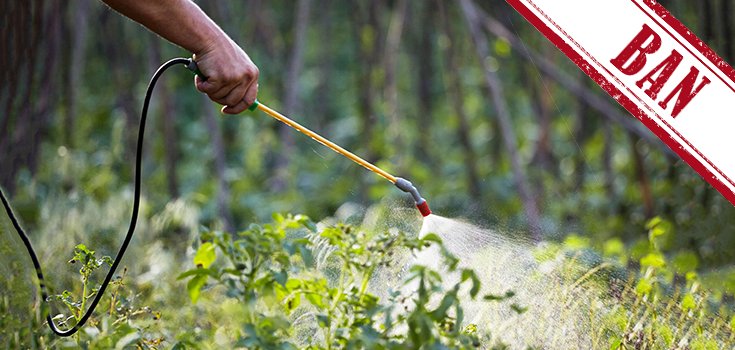Arkansas Temporarily Bans the Sale and Use of Dicamba Herbicide

After hundreds of Arkansas farmers claimed their crops had been harmed by the weed-killer dicamba, which was sprayed on neighboring fields, the Arkansas Plant Board voted June 23, 2017, to impose an unprecedented ban on the herbicide.
David Hundley, who manages grain production for Ozark Mountain Poultry in the town of Bay, said:
“It’s fracturing the agricultural community. You either have to choose to be on the side of using the product, or on the side of being damaged by the product.”
Monsanto created dicamba-resistant soy beans and cotton plants several years ago, but the chemical itself wasn’t a practical option for farmers prior to that.
Dicamba killed the weeds threatening the crops, all while leaving the soybeans unharmed, and farmers thought they’d finally found the answer to a devastating weed called pigweed (Palmer amaranth). Out of desperation to beat back the weeds, some farmers started spraying dicamba illegally, before it was approved for use.
But dicamba drifts easily in the wind, and it can land on and damage other crops. Non-GMO soybeans are especially susceptible to it. The herbicide can also damage fruit and vegetable farms, and ornamental trees. Dicamba was great news for farmers of GMO crops, but a nightmare for farmers that plant non-GMO seeds. [1] [2]
Read: Study: Dicamba Herbicide Chemicals DO Harm Non-Targeted Plants and Insects
Bob Scott, a specialist on weeds with the University of Arkansas’ agricultural extension service, said:
“Nobody was quite prepared, despite extensive training, for just how sensitive beans were to dicamba.” [1]
Earlier in 2017, a group of farmers filed a class-action lawsuit against the makers of dicamba – Monsanto and German chemical company BASF – over damage to their crops. The lawsuit seeks unspecified damages for damage to crops, fruits and trees that weren’t dicamba-resistant.
BASF is the only company that makes dicamba approved for use on crops in Arkansas. [2]
Farmers in Arkansas began registering their displeasure as soon as Spring rolled in. By June 23, some 242 complaints had been sent to state regulators regarding dicamba-damaged crops. [1]
The problem is clearly worsening; in 2016, the state received just over 2 dozen complaints about dicamba-related crop damage. [2]
Plant board member Terry Fuller after the vote:
“We don’t have an emergency. We have a disaster. It’s damage everywhere you look.”
Also in 2016, Missouri’s largest peach grower sued Monsanto alleging that the company was responsible for illegal herbicide use that the group claimed had caused widespread crop damage in the southeast part of Missouri and neighboring states. Other states eventually joined the suit, including Illinois.
Said Scott:
“This has far eclipsed any previous number of complaints that we’ve gotten, and unfortunately, this number seems to just keep growing. Every day we get an update with 8 or 10 more complaints.” [1]
Hundley said that “any soybean that’s not [resistant to dicamba] is exhibiting damage. I can name 15 farmers within 3 or 4 miles who have damage, and I can only name 3-4 farmers who have used the technology.”
So the Arkansas Plant Board gathered on June 20, 2017, to mull over an emergency ban on further spraying of dicamba, and farmers crowded the meeting to make an impassioned plea for their side.
A bit of procedural confusion at the initial meeting prevented the board from holding a vote that day. The meeting reconvened on June 23, however, and voted, 9-5, to ban any spraying of dicamba on any crops except for pasture land for 120 days.
Sources:
[1] NPR
